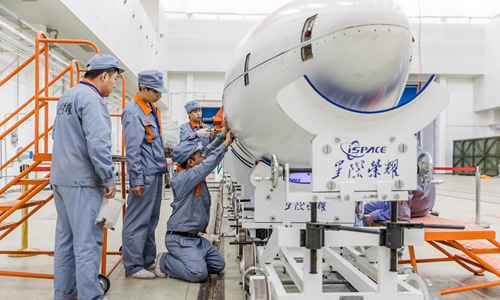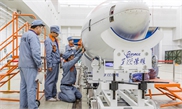
iSpace engineers prepare the company's first orbital carrier rocket in July 2019. Photo: Courtesy of iSpace
Chinese private rocket firm iSpace said late Monday that it has completed investigation of its previous unsuccessful rocket launch, vowing that the firm will ramp up efforts on management and technology improvement.Its launch of the second SQX-1 commercial carrier rocket failed on February 1. Abnormal performance was identified during the flight of the rocket, which lifted off from the Jiuquan Satellite Launch Center in northwest China.
"Following 28 days of investigation and analysis, we have completed problem location analysis, fault simulation and recurrence, test verification and assessment and improvement measures," iSpace said, according to its official WeChat account.
The flight failure of the SQX-1 Y2 rocket was located within a piece of insulation foam that should have fallen off. After falling off, it fell on the IV grid rudder, causing the rudder to be blocked under the action of aerodynamic pressure, and the foam was blown off again from the rudder during later flight. After the rudder resumed the control system to track the command, the rudder deflection angle completed a deflection of more than 30 degrees in a short time, which caused a sudden change in the attitude of the rocket body, which led to the failure of the flight, according to the firm's analysis.
iSpace will strengthen management and technical capabilities, enhance quality awareness for all employees, improve risk identification and resolution capabilities, while maintain awe for space, flight and technology, the firm said.
In July 2019, iSpace's carrier rocket successfully sent satellites in orbit from the Jiuquan Satellite Launch Center, marking a milestone for China's commercial space industry as the first private space firm to do so.
The firm was reportedly in January planning to conduct an IPO in the STAR Market in Shanghai. If the listing goes smoothly, it will become the first commercial rocket firm listed on the market in China.

